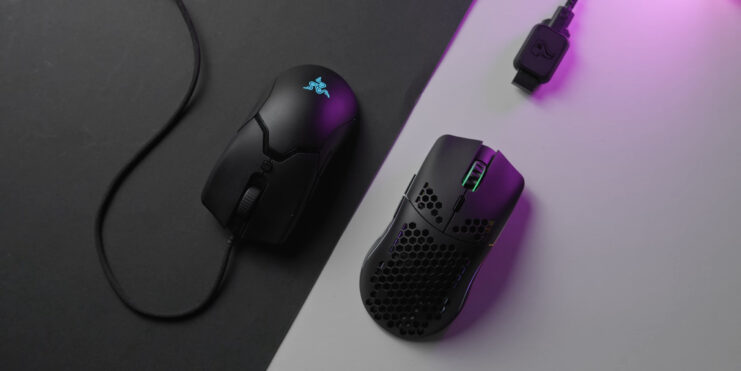Choosing the right mouse for gaming is crucial because of performance, precision, and enhancing your overall gaming experience. The debate between wired and wireless mice has been ongoing, with each type offering distinct advantages and disadvantages.
Traditionally, wired mice were considered the gold standard for gaming due to their reliability and responsiveness. However, advancements in wireless technology have significantly closed the gap, making wireless mice a formidable option for gamers.
That is where I step in. I want to provide you with my two cents of the subject, through examining all the crucial factors.
Key Takeaways:
- Wired Mice offers virtually no lag or latency due to their direct USB connection.
- Wireless Mice used to face challenges with delay and interference, but modern technology overcame this issue.
- Technological improvements in mouse sensors have leveled the playing field between wired and wireless mice.
Performance
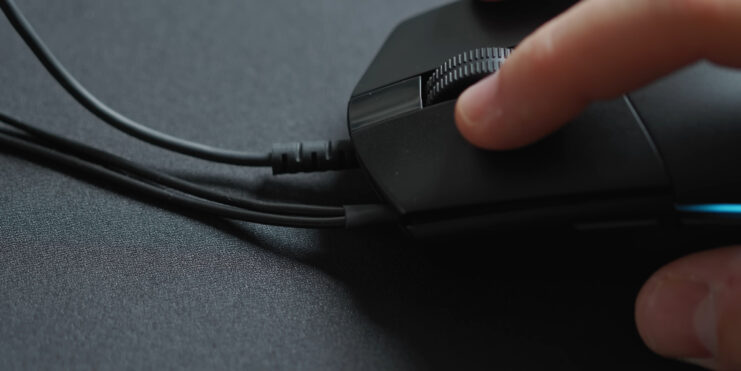
Performance comes first, and that is why I want to take a look at it before we progress further.
Lag, Latency, and Interference
The primary concern for gamers when choosing a mouse is performance, particularly in terms of lag, latency, and interference. Wired mice have a direct connection to the computer, ensuring a virtually instantaneous transmission of data. This direct line minimizes the chances of lag and latency, providing a seamless gaming experience.
On the other hand, wireless mice communicate with the computer through the air, which historically introduced a potential for delay and interference.
However, modern wireless mice have made leaps in technology, with proprietary solutions like Logitech’s Lightspeed and Corsair’s SLIPSTREAM technology, offering latencies as low as 1ms, rivaling their wired counterparts.
| Feature | Wired Mouse | Wireless Mouse |
|---|---|---|
| Connection Type | Direct USB connection | Bluetooth or 2.4GHz wireless connection |
| Lag | Virtually none | Minimal with modern technology |
| Latency | Instantaneous | Can be as low as 1ms with advanced technologies |
| Interference | Not applicable | Possible, but greatly reduced with technologies like Logitech’s Lightspeed and Corsair’s SLIPSTREAM |
| Transmission of Data | Continuous and stable | Continuous, with potential for minimal delays |
Precision and Responsiveness
It’s important to understand that the technological advancements in mouse sensors have significantly leveled the playing field between wired and wireless options. High DPI ratings, which can go as high as 20,000 DPI or more, allow for extremely precise tracking.
This means that the cursor or crosshair moves exactly where the gamer intends, with minimal lag or deviation. Such precision is crucial in fast-paced games where a fraction of a second can determine the outcome of a match. The DPI number alone doesn’t tell the whole story.
The efficiency of a mouse in gaming also depends on its polling rate, the speed at which the mouse reports its position to the computer. Higher polling rates, measured in hertz (Hz), can reduce the time between the mouse movement and the action being reflected on the screen, thereby enhancing responsiveness.
| Feature | Description | Importance for Gaming |
|---|---|---|
| DPI (Dots Per Inch) | Measures the sensitivity of the mouse. Higher DPI allows for finer control over cursor movements. | High |
| Polling Rate | The rate at which the mouse reports its position to the computer, measured in Hz. | High |
| Sensor Type | Optical and laser sensors track movement. Optical sensors are more common and preferred for gaming due to better surface tracking. | Moderate |
| Connection Type | Wired mice connect via USB, while wireless mice use Bluetooth or a USB receiver. | Moderate |
| Latency | The delay between a physical movement and the corresponding action on screen. Lower latency is better for gaming. | High |
| Consistency | How reliably the mouse performs under different gaming conditions. | High |
While both wired and wireless mice can offer the precision and responsiveness needed for competitive gaming, the choice often boils down to personal preference and specific gaming scenarios. Wired mice traditionally offer a more consistent connection with negligible latency, making them a staple in the competitive gaming scene.
On the other hand, wireless technology has made significant strides, with many models now offering performance on par with their wired counterparts, without the hassle of cables.
Convenience and Mobility
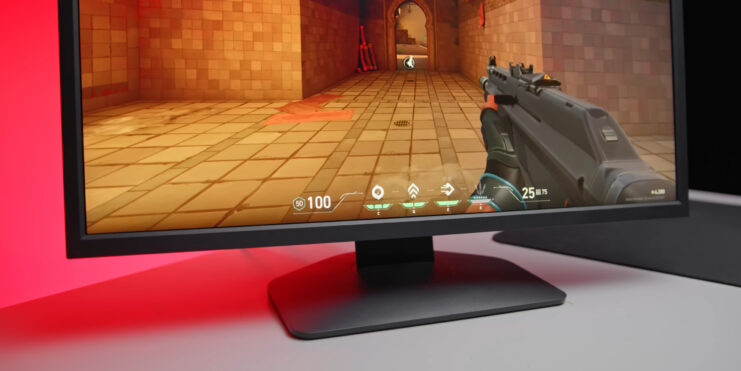
After you ensure the performance is top-notch, the next aspect is mobility.
Freedom of Movement
One of the most significant advantages of wireless mice is the freedom of movement they offer. Without a cable, gamers can enjoy a wider range of motion without worrying about cable drag or getting tangled during intense gaming sessions.
This makes wireless mice particularly appealing for gamers with large monitors or multi-monitor setups. Wired mice, while limited by the length of their cable, often come with high-quality, flexible cables and options like mouse bungees to mitigate drag and improve mobility.
Setup and Usability
Wired mice are generally plug-and-play, offering a straightforward setup without the need for batteries or worrying about power levels. Wireless mice, while slightly more complex in setup due to Bluetooth pairing or the use of a USB receiver, offer a cleaner, more streamlined desk setup without the clutter of cables.
This can be a significant advantage for gamers who value a minimalist gaming station or frequently travel with their gaming gear.
Battery Life
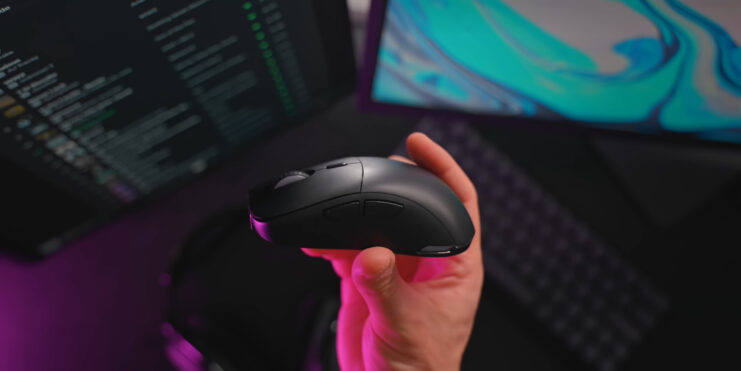
For wireless mice, battery life is a crucial consideration. Modern wireless gaming mice offer extended battery life, with some models lasting up to 70 hours on a single charge. Features like auto-sleep modes and power-efficient sensors help maximize battery life, but the need to recharge or replace batteries can still be a drawback for some gamers.
Wired mice, by contrast, draw power directly from the computer, eliminating any concerns about battery life and ensuring uninterrupted gaming sessions.
| Feature | Impact on Battery Life | Description |
|---|---|---|
| Auto-Sleep Modes | Extends battery life | Wireless mice often include sensors that detect inactivity and put the mouse into a low-power state to conserve battery. |
| Power-Efficient Sensors | Reduces energy consumption | Modern mice are equipped with sensors that require less power for tracking, contributing to longer battery life. |
| Battery Type | Affects longevity and performance | Wireless mice can use built-in rechargeable batteries or replaceable AA/AAA batteries, each with its own set of pros and cons. |
| Usage Intensity | Directly impacts battery duration | The more intensive the usage (e.g., high DPI settings, constant movement), the faster the battery will deplete. |
| RGB Lighting | Can significantly reduce battery life | While aesthetically pleasing, active RGB lighting on a mouse can drain the battery much faster than when it’s turned off. |
| Charging Options | Influences usability and convenience | Some wireless mice come with charging docks or cables that allow for use while charging, mitigating the issue of downtime. |
Price Comparison
Generally, wireless mice tend to be more expensive than their wired counterparts. The additional technology required for wireless communication, such as Bluetooth or proprietary wireless technologies, adds to the cost.
The price gap has been narrowing, with affordable wireless options becoming more prevalent. When considering price, it’s essential to weigh the benefits of wireless freedom against the reliability and simplicity of a wired connection.
| Type | Price Range | Considerations |
|---|---|---|
| Wired Mice | $15 – $100+ | – Lower end: Basic functionality with decent precision. – Higher end: Advanced sensors, customizable buttons, and RGB lighting. |
| Wireless Mice | $30 – $200+ | – Lower end: Basic wireless functionality, possibly with lower battery life and minimal extra features. – Higher end: Cutting-edge wireless technology, high precision, extensive battery life, customizable buttons, and RGB lighting. |
Aesthetics and Design
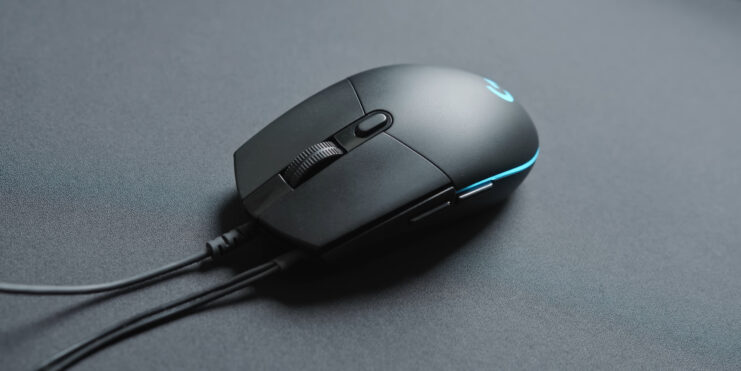
The aesthetics of a gaming setup can be significantly influenced by the choice between a wired and wireless mouse. Wireless mice offer a cleaner, more organized desk space free from the clutter of cables. This can be particularly appealing to gamers who prioritize a minimalist setup or who have limited desk space.
Wired mice, while potentially adding to cable clutter, often come with customizable RGB lighting and other design features that enhance the gaming ambiance. The choice between wired and wireless can thus also reflect personal preference in desk aesthetics and the importance of a visually appealing gaming environment.
FAQs
Are gaming mouses worth it?
Yes, gaming mice are worth it for serious gamers. They offer higher precision, customizable buttons for complex actions, and better ergonomics for long gaming sessions, enhancing overall gaming performance and comfort.
Can a mouse increase FPS?
No, a mouse cannot increase the frames per second (FPS) of a game, as FPS is determined by the computer’s hardware and graphics settings. However, a gaming mouse can improve your reaction time and accuracy, which might make the game feel smoother.
Does a cheap mouse affect gaming?
Yes, a cheap mouse can affect gaming. Lower-quality mice may have less precise sensors, slower response times, and less durable construction, which can hinder gaming performance and lead to a less enjoyable gaming experience.
Does keyboard matter for gaming?
Yes, the keyboard matters for gaming. Gaming keyboards offer features like mechanical switches for faster and more tactile responses, anti-ghosting for simultaneous key presses, and customizable keys for gaming shortcuts, all of which can significantly enhance gaming performance and immersion.
The Verdict
The decision between a wired and wireless gaming mouse ultimately comes down to personal preference and specific gaming needs. Wired mice offer reliability and simplicity, with no concerns about battery life or connectivity issues.
Wireless mice provide freedom of movement and a cleaner gaming setup but require consideration of battery life and potential connectivity challenges. My personal opinion is that wireless mice are a far better opinion.
However, it goes without saying that this is a personal opinion which might not suit everyone.

